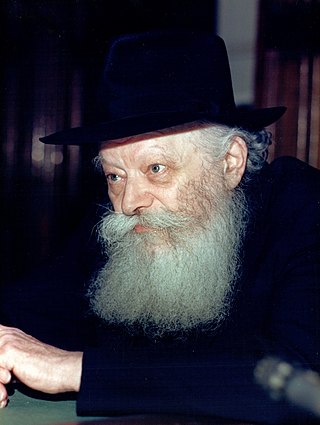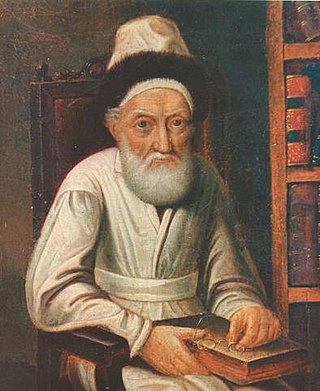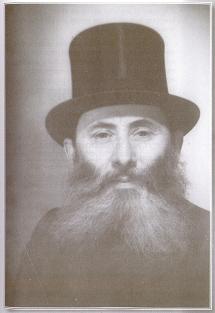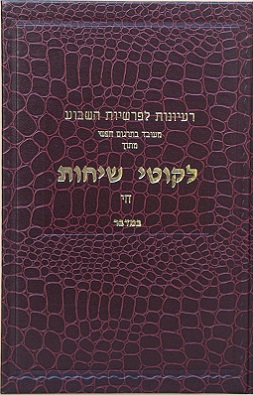
In Judaism, the Seven Laws of Noah, otherwise referred to as the Noahide Laws or the Noachian Laws, are a set of universal moral laws which, according to the Talmud, were given by God as a covenant with Noah and with the "sons of Noah"—that is, all of humanity.

Menachem Mendel Schneerson, known to adherents of the Chabad-Lubavitch movement as the Lubavitcher Rebbe or simply the Rebbe, was an Orthodox rabbi and the most recent Rebbe of the Lubavitch Hasidic dynasty. He is considered one of the most influential Jewish leaders of the 20th century.

Menachem Mendel Schneersohn also known as the Tzemach Tzedek was an Orthodox rabbi, leading 19th-century posek, and the third rebbe of the Chabad Lubavitch Hasidic movement.

The Mishneh Torah, also known as Sefer Yad ha-Hazaka, is a code of Rabbinic Jewish religious law (halakha) authored by Maimonides. The Mishneh Torah was compiled between 1170 and 1180 CE, while Maimonides was living in Egypt, and is regarded as Maimonides' magnum opus. Accordingly, later sources simply refer to the work as "Maimon", "Maimonides", or "RaMBaM", although Maimonides composed other works.
The Dardaim or Dor Daim, are adherents of the Dor Deah movement in Orthodox Judaism. That movement took its name in 1912 in Yemen under Rabbi Yiḥyah Qafiḥ, and had its own network of synagogues and schools, although, in actuality, the movement existed long before that name had been coined for it. According to ethnographer and historian, Shelomo Dov Goitein, author and historiographer, Hayyim Habshush had been a member of this movement before it had been given the name Dor Deah, writing, “...He and his friends, partly under European influence, but driven mainly by developments among the Yemenite Jews themselves, formed a group who ardently opposed all those forces of mysticism, superstition and fatalism which were then so prevalent in the country and strove for exact knowledge and independent thought, and the application of both to life.” It was only some years later, when Rabbi Yihya Qafih became the headmaster of the new Jewish school in Sana'a built by the Ottoman Turks and where he wanted to introduce a new curriculum in the school whereby boys would also learn arithmetic and the rudiments of the Arabic and Turkish languages that Rabbi Yihya Yitzhak Halevi gave to Rabbi Qafih's movement the name Daradʻah, a word which is an Arabic broken plural made-up of the Hebrew words Dör Deʻoh, and which means "Generation of Knowledge."

Ger toshav is a halakhic term used in Judaism to designate the legal status of a Gentile (non-Jew) living in the Land of Israel who does not want to convert to Judaism but agrees to observe the Seven Laws of Noah, a set of imperatives which, according to the Talmud, were given by God as a binding set of universal moral laws for the "sons of Noah"—that is, all of humanity. A ger toshav, especially one who decides to follow the Noahic covenant out of religious belief rather than ethical reasoning, is commonly deemed a "Righteous Gentile", and is assured of a place in the World to Come .
Menachem ben Solomon HaMeiri, commonly referred to as HaMeiri, the Meiri, or just Meiri, was a famous medieval Provençal rabbi, and Talmudist. Though most of his expansive commentary, spanning 35 tractates of the Talmud, was not publicly available until the turn of the 19th century, it has since gained widespread renown and acceptance among Talmudic scholars.

Kehot Publication Society is the publishing division of the Chabad-Lubavitch movement.

Joseph Rosen known as the Rogatchover Gaon and Tzofnath Paneach, was an Ashkenazi rabbi and one of the most prominent talmudic scholars of the early 20th-century. Rosen was known as a gaon (genius) because of his photographic memory and tendency to connect sources from the Talmud to seemingly unrelated situations. Rosen has been described as the foremost Talmudic genius of his time. He is also estimated to have written some 50,000 responsa, making him the most prolific responsa-writer in Jewish history.
Chiddushei Rabbeinu Chaim HaLevi Al-HaRambam is a volume of commentary by Rabbi Chaim Soloveitchik on Maimonides’ Mishneh Torah. It also contains original commentary on the Talmud. There are 154 pieces in the work, with some themes overlapping through multiple pieces. Soloveitchik was the founder of the Brisker Derech, and was known for reconciling contradictions in Maimonides' writings. The text was written in a very terse style whose intricacy is difficult even for those very familiar with the Brisker Derech, and was written for those already on a very advanced level of Talmudic and Halachic study. Rabbi Chaim’s son Rabbi Moshe Soloveichik first printed it posthumously in 1936, he stated in the preface that his father wrote it with extreme precision, having “sifted the text seven times over and winnowed it a hundred times more.” Some years later a commentary on Chiddushei Rabbeinu Chaim was written by Rabbi Chaim's student Rabbi Yehezkel Abramsky. Audio explanations of the entire work are available on podcast from Rabbi Elisha Friedman.
Meir ben Todros HaLevi Abulafia, also known as the Ramah, was a major Sephardic Talmudist and Halachic authority in medieval Spain.

Menachem Mendel Kasher was a Polish-born Israeli rabbi and prolific author who authored an encyclopedic work on the Torah entitled Torah Sheleimah.

Likkutei Sichos, literally, "Collected Talks" contains both the scope and the core of the teachings of the Lubavitcher Rebbe, Rabbi Menachem Mendel Schneerson, and is the most authoritative source-text for Schneerson's way of explaining Judaism and the world writ large.

Kol Menachem is an independent Chabad publishing house based in Crown Heights, Brooklyn, founded by philanthropist Meyer Gutnick and Rabbi Chaim Miller in 2000. Its goal is "to organize the teachings of Rabbi Menachem Mendel Schneerson and make them universally accessible and useful."

Chabad philosophy comprises the teachings of the leaders of Chabad-Lubavitch, a Hasidic movement. Chabad Hasidic philosophy focuses on religious concepts such as God, the soul, and the meaning of the Jewish commandments.

Toras Chaim is a two-volume work of Hasidic discourses on the books of Genesis and Exodus by the second Chabad Rebbe, Rabbi Dovber Schneuri. The work is arranged in a similar fashion as Likutei Torah/Torah Or, a fundamental work on Chabad philosophy authored by Rabbi Dovber's father, Rabbi Shneur Zalman of Liadi, the founder of the Chabad movement. Both works are arranged according to the weekly Torah portion.

Shikun Chabad, also spelled Shikun Habad, is a Hasidic Jewish neighborhood in northern Jerusalem. It includes the oldest Hasidic yeshiva in Israel and Jerusalem, Yeshivas Toras Emes.

Derech Chaim is a work on the subject of repentance by the second Rebbe of the Chabad Hasidic movement, Rabbi Dovber Schneuri.

Daily Rambam Study is an annual study cycle that includes the daily study of Maimonides' magnum opus, Mishneh Torah. The study regimen was initiated by Rabbi Menachem Mendel Schneerson in the spring of 1984 with three tracks. The first track includes studying three chapters a day, so that the entire fourteen books are completed in less than one year. Participants in the second track study one chapter daily and complete the entire Mishneh Torah in approximately three years. A third track that parallels the three chapter track includes the study of Sefer Hamitzvos.

Anger in Judaism is treated as a negative trait to be avoided whenever possible. The subject of anger is treated in a range of Jewish sources, from the Hebrew Bible and Talmud to the rabbinical law, Kabbalah, Hasidism, and contemporary Jewish sources.










